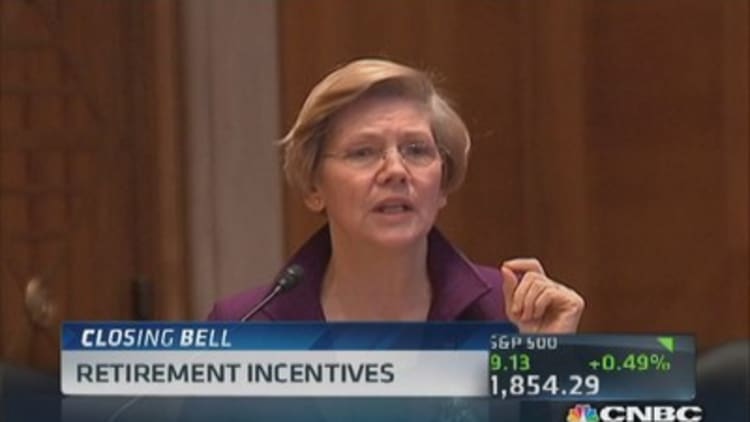President Obama's proposed budget for 2015 would be a disaster for the millions of Americans who are underprepared for retirement. This plan would reduce the tax incentives for employers to offer retirement plans to their employees.
Let's examine the backdrop.
Our country's retirement situation is a mess. Social Security is grossly underfunded and is headed for insolvency, yet neither political party has the guts to offer any real solutions.
Corporations killed their pension plans years ago because they couldn't afford them, while government pension schemes are beyond broke and causing havoc in many cities and municipalities.
The largest retirement-savings vehicle in the U.S. is the defined contribution plan—namely, the 401(k) plan. This is a plan in which employees may elect a portion of their paycheck to go into an account earmarked for retirement. They receive a tax deduction for the amount that is saved and will realize the taxes when the money is withdrawn during retirement.
Saving is hard for most of us, but it's not the tax deduction that makes the 401(k) so attractive. The real beauty of the 401(k) is that the money is yanked out of one's paycheck before the worker has a chance to spend it.
(Read more: Plan for independence, not retirement)
If you work for a Fortune 500 company, odds are you have a decent 401(k) plan and Obama's budget won't have much impact on you.
However, if you are like the millions of Americans who work for a small company, this budget may kill your chance for any sort of financial independence during retirement.
Obama's 2015 budget would reduce the tax incentive for business owners to establish and maintain a 401(k) plan. Currently, all employees can participate in a 401(k) plan, and all employees are able to avoid current taxation on the money they place into the plan.

Under Obama's budget plan, higher-income earners would be limited to a tax deduction at the 28 percent level, even if their current income-tax bracket is much higher.
If this budget actually becomes law, a person who is at the highest marginal tax bracket of 39.6 percent (this doesn't include state income taxes or the 3.8 percent Obamacare tax) would only be entitled to a tax deduction equal to those individuals in the 28 percent tax bracket.
So while they would receive only a partial deduction today, when they withdraw the money during retirement, they would be fully taxed at their current tax rate.
This means they would not only pay taxes on some of their contributions today, they are fully taxed when they withdraw the money in the future. This, of course, is double taxation.
(Read more: The psychology of 401(k) investment)
Given that most of the high-income taxpayers are business owners, are they really going to want to start a retirement plan that has the very real potential to be both professionally and personally bad for them? Retirement plans are costly to set up and expensive and time-consuming to maintain. In addition to the hard costs, the Department of Labor can walk into a business at any time to audit the plan.
Large corporations have the staff to deal with government regulators, but having one more governmental agency to deal with is tough for small businesses.
The fact is, more Americans work for small businesses than for large corporations.These hardworking folks deserve the same sort of retirement-savings incentives as those who work for a Fortune 500 company. Unfortunately, this bill will deprive those folks of this valuable tool.
So what are some other ways this administration could deal with the looming retirement crisis?
(Read more: CNBC readers get the power of saving)
How about opening up the tax deduction for retirement savings to all workers? Currently, if you work for an employer that offers a retirement plan, you can contribute up to $17,500 per year ($23,000 if you are 50 or older) to that plan.
However, if your employer doesn't offer a retirement plan, you are limited to using an individual retirement account plan with a maximum contribution of just $5,500 per year (add another $1,000 if you are 50 or older). This makes absolutely no sense. Why should your employer have the power to control how much you save for retirement?
Each year, there are billions of dollars that are withdrawn from 401(k) plans because people change jobs and either withdraw their account balance or default on an outstanding 401(k) loan.
The president's budget proposal, while attempting to restrict the wealthy from saving more for retirement, will actually create additional hardships for the working class.
Tax laws require a 20 percent withholding for money withdrawn from 401(k) plans, but that doesn't do anything to help an employee. It simply takes some of the money and gives it to the government.
What if there were much greater restrictions on early withdrawals from retirement accounts?
Loans from 401(k) plans are certainly not good for retirement savings, either. Why do these plans allow for loans? IRAs don't.
(Read more: Ways to grow your 401(k) at any age)
It's estimated that 25 percent of 401(k) plan savers have taken a loan at one time or another. If these loans aren't paid back in a timely manner and go into default, the government treats the loans as withdrawals and whacks the worker with harsh additional taxes. Perhaps the loans aren't such a good idea.
There are a variety of methods that could help workers save more for retirement. The president's budget proposal, while attempting to restrict the wealthy from saving more for retirement, will actually create additional hardships for the working class.
The wealthy will figure out ways to have a secure retirement, regardless, but the average worker will surely be hurt if this budget does indeed become law.
—By Scott Hanson, Special to CNBC.com. Scott Hanson, a certified financial planner, is a senior partner at Hanson McClain Advisors in Sacramento, Calif.




